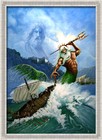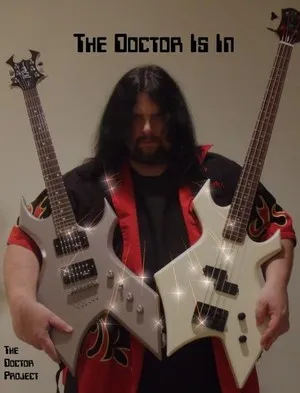Lyrics
In Greek mythology, Poseidon (Greek: ¦°¦Ï¦Ò¦Å¦É¦Äῶ¦Í; Latin: Nept¨±nus) was the god of the sea, as well as of horses and, as "Earth-Shaker," of earthquakes. The name of the sea-god Nethuns in Etruscan was adopted in Latin for Neptune in Roman mythology; both were sea gods analogous to Poseidon. Graffiti show that Poseidon was venerated in Bronze Age Greece, but as he was integrated into the Olympian gods. Poseidon is the brother of Zeus and Hades and has many children. There is a Homeric hymn to Poseidon, who was the protector of many Hellenic cities, though he lost the contest for Athens to Athena.
Poseidon was a major civic god of several cities: in Athens, he was second only to Athena in importance; while in Corinth and many cities of Magna Graecia he was the chief god of the polis.
Sailors prayed to Poseidon for a safe voyage, sometimes drowning horses as a sacrifice. In his benign aspect, Poseidon was seen as creating new islands and offering calm seas. When offended or ignored, he supposedly struck the ground with his trident and caused chaotic springs, earthquakes, drownings and shipwrecks.
According to Pausanias, Poseidon was one of the caretakers of the Oracle at Delphi before Olympian Apollo took it over. Apollo and Poseidon worked closely in many realms: in colonization, for example, Apollo provided the authorization to go out and settle from Delphi, while Poseidon watched over the colonists on their way, and provided the lustral water for the foundation-sacrifice. Xenophon's Anabasis describes a group of Spartan soldiers singing to Poseidon a paean - a kind of hymn normally sung for Apollo.
Poseidon was a son of Cronus and Rhea. In most accounts, he is swallowed by Cronus at birth. However in some versions of the story, he, like his brother Zeus, did not share the fate of his other brother and sisters who were eaten by Cronus. He was saved by his mother Rhea, who is said to have fed a baby horse to Cronus, serving the same purpose as the rock in Zeus's case.
In some variants, Poseidon was raised by the Telchines on Rhodes, just as Zeus was raised by the Korybantes on Crete.
When the world was divided in three, Zeus received the sky, Hades the underworld and Poseidon the sea.
His wife was Amphitrite, a nymph and ancient sea-goddess, daughter of Nereus and Doris.
Poseidon was the father of many heroes. He is thought to have raped Aethra thus fathering the famed Theseus. A mortal woman named Tyro was married to Cretheus (with whom she had one son, Aeson) but loved Enipeus, a river god. She pursued Enipeus, who refused her advances. One day, Poseidon, filled with lust for Tyro, disguised himself as Enipeus and from their union were born the heroes Pelias and Neleus, twin boys. Poseidon had an affair with Alope, his granddaughter through Cercyon, begetting the Attic hero Hippothoon. Cercyon had his daughter buried alive but Poseidon turned her into the spring, Alope, near Eleusis.
Poseidon rescued Amymone from a lecherous satyr and then fathered a child, Nauplius, by her.
After having sex with Caeneus, Poseidon fulfilled her request and changed her into a man.
Not all of Poseidon's children were human. In an archaic myth, Poseidon once pursued Demeter. She spurned his advances, turning herself into a mare so that she could hide in a herd of horses; he saw through the deception and became a stallion and captured her. Their child was a horse, Arion, which was capable of human speech. With Medusa, Poseidon had sexual intercourse on the floor of a temple to Athena. Medusa was changed into a monster. When she was later beheaded by the hero Perseus, Chrysaor and Pegasus emerged from her neck. There is also Triton, the merman; Polyphemus, the cyclops; and Oto and Ephialtae, the giants.

